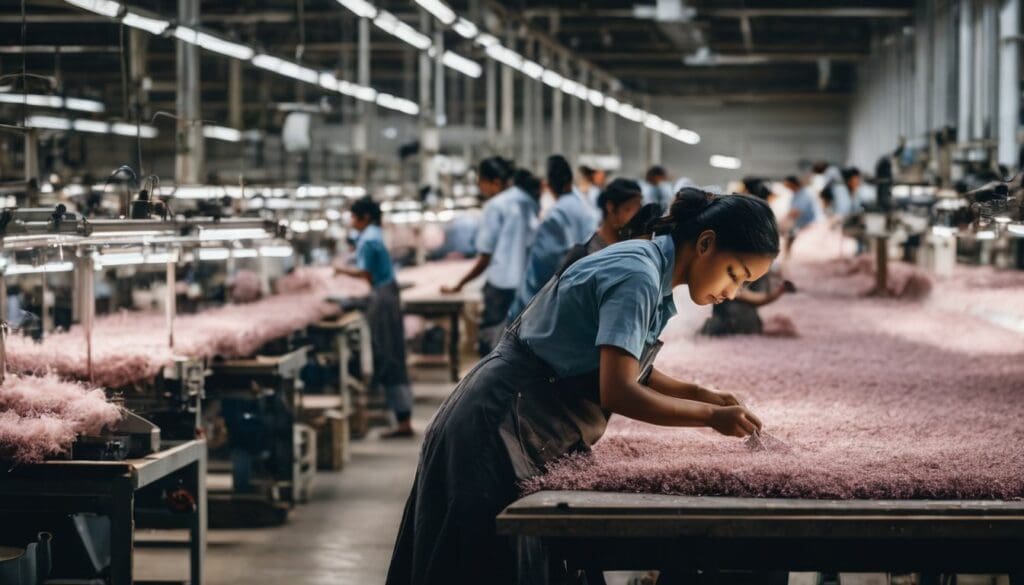Shopping for the newest threads on the high street can sometimes leave us in a bit of a moral pickle. Just like you, we’re ever so aware that our choices in fashion speak volumes about our values.
That’s why we’ve rolled up our sleeves and dug deep into the world of fair trade – an incredibly potent answer to this modern conundrum. In this blog, we’ll be your trusty guide through the ethical labyrinth of clothing production, illuminating how each piece you pick can contribute positively to this big old world of ours.
Stick with us – together, let’s dress for change!
Key Takeaways
- Fair trade in fashion ensures workers get fair wages and safe working environments, helping to break cycles of poverty while also safeguarding the environment through sustainable practices.
- Fair Trade Certified and other labels help consumers identify clothing made ethically; supporting these brands can drive industry-wide change towards more conscientious production methods.
- The movement combats issues like child labour, forced labour, animal exploitation, and cultural appropriation by adhering to strict ethical standards during production.
- By opting for fair trade fashion, shoppers play a vital role as ethical consumers, influencing the market demand for transparent supply chains and environmentally responsible manufacturing processes.
- Promoting slow fashion is another aspect of fair trade; it prioritises quality over quantity, reducing waste and decreasing the impact on our planet.
Understanding Fair Trade in the Fashion Industry
Fair trade in the fashion industry refers to ethical and sustainable production practices that prioritise fair wages, safe working conditions, and environmental responsibility. It matters because it ensures that workers are not exploited, promotes environmentally friendly practices, and supports economic empowerment for marginalised communities.
The difference between fair trade and Fairtrade lies in the certification process – Fairtrade is a specific certification awarded to products that meet certain standards.
What is fair trade?
Fair trade stands as a powerful movement committed to transforming the global fashion industry. It champions ethical production, ensuring that the people who make our clothes receive fair wages and work in safe conditions.
This movement pushes for change by setting standards for companies to follow, focusing on social responsibility and worker rights above profits.
We see the impact of fair trade every time we pick up clothing that carries its mark. By adhering to established principles set out by organisations like the World Fair Trade Organisation (WFTO), brands partaking in this initiative agree to prioritise the well-being of their workers while respecting environmental guidelines.
Clothing produced under these terms helps empower communities and ensures sustainable practices are woven into the very fabric of what we wear.
Why does it matter?
Fair trade in the fashion industry matters because it prioritises fair treatment for workers and ethical production practices. With sustainable fashion on the rise, embracing fair trade principles is crucial for promoting social responsibility and environmentally friendly practices.
By supporting fair trade clothing, we contribute to a global movement that empowers producers and ensures transparency in the supply chain. Embracing ethical sourcing not only promotes fair wages but also works towards eliminating child labour and forced labour within the industry.
Prioritising fair trade principles aligns with our commitment to a more socially conscious and sustainable fashion industry. This encourages improvements in production processes, ensuring that workers are treated ethically while promoting cultural sustainability.
The difference between fair trade and Fairtrade
Fair trade and Fairtrade are often used interchangeably, but they have distinct meanings. “Fair trade” is a broader concept that encompasses various ethical trading practices across different industries, including fashion.
On the other hand, “Fairtrade” refers to a specific certification system for products that meet its rigorous standards of fair pricing and working conditions for producers in developing countries.
While fair trade principles apply to many goods, Fairtrade specifically focuses on agricultural products like coffee or cocoa.
The Principles of Fair Trade
Fair trade encompasses principles such as creating economic opportunities for disadvantaged producers, promoting transparency and ethical trading practices, ensuring fair payment and working conditions, and respecting the environment.
These principles are at the core of fair trade in the fashion industry, driving positive change within supply chains.
Creating opportunities for economically disadvantaged producers
Fair trade initiatives open doors for economically disadvantaged producers by providing fair payment and safe working conditions. This helps in breaking the cycle of poverty, empowering workers to support themselves and their families.
Fair trade also encourages inclusive practices, ensuring that marginalised communities have access to opportunities for sustainable livelihoods.
By focusing on ethical sourcing and production, fair trade enhances economic stability within vulnerable communities while promoting social development and environmental responsibility.
Ensuring transparency and accountability
Fair trade principles prioritise transparency and accountability in the fashion industry. This means ensuring that all stages of production, from sourcing materials to manufacturing, are open and clear.
By embracing transparent supply chains, fair trade establishes trust between producers and consumers. Furthermore, it holds businesses accountable for their ethical practices, ensuring fair payment for workers and eliminating exploitative labour conditions.
The World Fair Trade Organization’s standards emphasise transparency to guarantee that clothing is produced ethically. This includes knowing where materials come from and how they are processed.
Promoting ethical trading practices
Promoting ethical trading practices involves prioritising workers’ rights and fair wages in the fashion industry. This means ensuring that clothing is produced under strict ethical standards, taking into consideration the best interest of the workers involved.
Through instilling terms of trade and promoting ethical sourcing, fair trade principles in fashion aim to create a more sustainable and socially conscious industry. Additionally, embracing ethical sourcing is crucial for building an environmentally responsible supply chain while empowering producers and promoting social responsibility.
Fair trade clothing promotes empowerment by encouraging improvements in production processes and ensures fair wages for workers involved throughout the fashion industry’s supply chain.
Fair payment and working conditions
Transitioning from promoting ethical trading practices to fair payment and working conditions, it is essential to prioritise fair wages and safe working environments for all fashion industry workers.
Fair trade clothing production ensures that employees receive proper compensation for their work, giving them financial stability and security. Moreover, stringent guidelines are set in place to guarantee healthy and safe conditions during the production process.
These measures contribute to creating a more equitable and sustainable industry where worker well-being is at the forefront.
Eliminating child labor and forced labor
Transitioning from the importance of fair payment and working conditions, another crucial aspect of ethical fashion is the elimination of child labor and forced labor. Fair trade certification ensures that clothing is produced without exploiting vulnerable individuals.
This means that workers, including children, are not coerced or forced into work, but instead are provided with safe and suitable working environments in accordance with international labour standards.
Fair trade principles focus on protecting the rights of all workers involved in the production process, promoting a more sustainable and socially responsible fashion industry.
Respecting the environment
Fair trade in the fashion industry acknowledges the importance of respecting the environment through sustainable and eco-friendly production processes. This includes reducing carbon footprints by minimising international shipping, promoting animal welfare and ethical treatment, as well as addressing issues related to colonialism and appropriation.
By embracing fair trade principles, clothing brands can contribute to a more environmentally conscious approach to fashion manufacturing.
Moving beyond environmental concerns, it’s crucial to understand how fair trade is encouraging growth in slow fashion.
The Negative Impact of Conventional Clothing Production
The negative impact of conventional clothing production includes a large carbon footprint from international shipping, animal welfare exploitation, and issues surrounding colonialism and appropriation.
To learn more about these impacts and how fair trade is making a positive change in the fashion industry, read on.
Carbon footprint and international shipping
International shipping of clothing contributes significantly to the industry’s carbon footprint. The transportation of clothes across borders through ships releases a large amount of greenhouse gases, contributing to climate change and environmental degradation.
This aspect poses a challenge to fair trade as it’s vital for ethical fashion to minimise its impact on the environment and address sustainability concerns. Furthermore, the reliance on international shipping in conventional clothing production underscores the need for more sustainable and localised manufacturing practices.
Moving on from the global impacts of international shipping, let’s delve into another critical issue – Animal Welfare and Exploitation in Clothing Production.
Animal welfare and exploitation
Fair trade in the fashion industry also takes into account animal welfare, aiming to ensure ethical treatment of animals involved in clothing production. This includes advocating for the use of sustainable and cruelty-free materials, such as organic cotton, hemp, or bamboo, which minimises harm to animals and respects the environment.
Additionally, fair trade principles seek to eliminate exploitation of animals by promoting transparency in sourcing practices and discouraging the use of materials obtained through unethical means.
Embracing fair trade fashion can also lead to positive outcomes for animals and ecosystems. By prioritising ethical sourcing and production methods that respect wildlife habitats, fair trade contributes to environmental sustainability while upholding humane treatment for all living beings involved in the supply chain.
Colonialism and appropriation
Colonialism and appropriation in the fashion industry have historically resulted in exploitation and the misrepresentation of cultural elements. The colonial legacy has led to Western fashion brands appropriating traditional designs without proper acknowledgement or compensation to the originating cultures.
This practice not only perpetuates inequality but also undermines the significance of these cultural artefacts. By embracing fair trade principles, including respecting indigenous designs and compensating communities for their intellectual property, the fashion industry can move towards a more equitable and culturally respectful model.
Recognising and addressing colonialism and appropriation is essential for creating a more inclusive and ethical fashion landscape. Fair trade encourages brands to engage in meaningful partnerships with local artisans, ensuring that traditional craftsmanship is valued and protected.
How Fair Trade is Encouraging Growth in Slow Fashion
Fair trade practices are helping to support sustainable and ethical production in the fashion industry, empowering producers and communities while promoting cultural sustainability.
Through fair trade, consumers are encouraged to embrace slow fashion, which prioritises quality, durability, and ethical production over fast-paced trends.
Supporting sustainable and ethical production
Fair trade in the fashion industry supports sustainable and ethical production by prioritising fair wages and safe working conditions for workers. It also emphasises environmentally friendly practices, reducing the negative impact of clothing production on the environment.
Fair trade principles ensure that producers adhere to strict ethical guidelines, promoting transparency in supply chains and eliminating child labour or forced labour.
By embracing fair trade fashion, consumers contribute to a more socially responsible industry while empowering communities worldwide. This movement encourages businesses to adopt eco-friendly manufacturing processes and honour fair compensation for their workers.
Empowering producers and communities
The Fair Trade Movement empowers producers and communities by prioritising fair wages and working conditions. Through the implementation of ethical standards, workers are given the opportunity to thrive in a safe and transparent environment.
This movement also focuses on promoting social responsibility and environmental sustainability within communities involved in clothing production. By valuing the well-being of individuals and embracing ethical practices, fair trade initiatives seek to uplift both producers and their local communities, fostering a more equitable industry.
As we delve into the transformative impact of fair trade initiatives, let’s explore how sustainable fashion is driving positive change within the industry.
Promoting cultural sustainability
Fair trade in the fashion industry plays a crucial role in promoting cultural sustainability. It respects traditional craftsmanship and indigenous textile techniques, safeguarding the heritage of communities involved in clothing production.
By supporting fair trade fashion, consumers contribute to preserving diverse cultural identities and empowering artisans worldwide.
Embracing fair trade practices also means valuing traditional knowledge and skills, ensuring that ancient art forms are not lost amidst mass production. This helps sustain unique cultural practices while providing economic opportunities for artisans.
Joining the Fair Trade Community
Discovering and supporting fair trade fashion brands is a great way to join the fair trade community and promote ethical production in the fashion industry. By choosing to shop for fair trade clothing, we can contribute to empowering producers and creating positive change in the global supply chain.
How to shop for fair trade fashion
When shopping for fair trade fashion, look for clothing brands that are certified by reputable fair trade organisations such as the World Fair Trade Organization (WFTO) or Global Organic Textile Standard (GOTS).
- Check for labels and certifications: Look for fair trade labels and certifications such as Fair Trade Certified, Fair Wear Foundation, or Ethical Trading Initiative which ensure that the products meet ethical production standards.
- Research brands and their practices: Take time to research clothing brands to understand their commitment to fair trade principles, sustainable sourcing, and ethical manufacturing guidelines.
- Consider the supply chain transparency: Choose brands that provide transparency regarding their supply chain, ensuring that workers are paid fair wages, work in safe conditions, and do not face exploitation.
- Support local artisans and cooperatives: Look for fair trade fashion items from local artisans and cooperatives who uphold ethical production practices while preserving traditional craftsmanship.
- Prioritise eco-friendly materials: Seek out clothing made from sustainable materials like organic cotton, hemp, bamboo, or Tencel to reduce environmental impact and support ecofriendly fashion initiatives.
- Engage with ethical consumer communities: Connect with other ethical consumers through online platforms or communities to gain insights into fair trade fashion choices and share recommendations on sustainable brands.
Top fair trade clothing brands
- People Tree: This brand pioneers in sustainable fashion, adhering to Fair Trade principles and ensuring fair wages for its workers.
- Patagonia: Known for its commitment to environmental and social responsibility, Patagonia produces fair trade clothing while promoting transparency and ethical sourcing.
- Thought Clothing: Embracing sustainable materials and ethical production, Thought Clothing offers a range of stylish and eco-friendly clothing options aligned with Fair Trade practices.
- Eileen Fisher: Focused on sustainable and ethical practices, Eileen Fisher ensures fair treatment of workers throughout the supply chain while maintaining high-quality standards.
- Mata Traders: This brand champions fair trade by collaborating with female artisans in India and Nepal, providing them with equitable employment opportunities and fair wages.
The role of the ethical consumer
Ethical consumers play a crucial part in driving change within the fashion industry. By choosing to support fair trade clothing brands, they actively contribute to improving working conditions and ensuring fair wages for garment workers.
Their purchasing decisions directly impact the demand for ethically produced clothing, which further encourages businesses to adopt more sustainable and socially responsible practices.
Consumers hold immense power in shaping the future of fashion by demanding transparency and ethical sourcing from brands. Their advocacy for fair labor practices not only supports workers’ rights but also promotes environmental responsibility within the industry, creating a ripple effect that fosters positive change.
Conclusion
In conclusion, fair trade in the fashion industry plays a crucial role in ensuring ethical production practices. It empowers workers, promotes environmental responsibility, and encourages sustainable processes.
Embracing fair trade principles is essential for creating a more socially conscious and sustainable fashion industry. By supporting fair trade clothing brands and ethically produced garments, consumers can contribute to positive change within the fashion supply chain.
Joining the fair trade movement is an impactful way to advocate for fairness and equality throughout the entire fashion industry.
FAQs
1. What is the Fair Trade Movement in the fashion industry?
The Fair Trade Movement in the fashion industry is a social movement that promotes ethical production, ensuring workers get fair wages and work under good conditions.
2. Why should businesses adopt ethical trade manufacturing?
Businesses should adopt ethical trade manufacturing to support sustainable production practices and take responsibility for their role in promoting ethical consumerism.
3. How do regulations impact ethical clothing production?
Ethical clothing production regulations set standards for treating workers fairly and help protect the environment by encouraging sustainable practices across the industry.
4. What can consumers do to support fair wages in the clothing industry?
Consumers can help ensure fair wages by choosing to buy from brands that commit to corporate social responsibility and practice ethical trade manufacturing in producing their garments.





